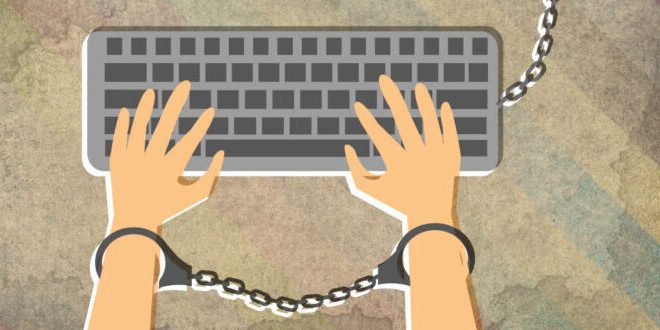By: Mohammed Gahlan
The Republic of Yemen, formed in 1990 from the unification of the Yemen Arab Republic (North Yemen) and the People’s Democratic Republic of Yemen (South Yemen), embarked on a path towards democratization, adopting multiparty pluralism, democratic elections, and freedom of expression. While initial steps were taken, including the establishment of political parties and the proliferation of independent media, the reality of freedom of expression has been consistently undermined by successive governments. This essay examines the violations of freedom of opinion and expression in Yemen, with a particular focus on the government’s control over the internet.
A central hypothesis is that despite formal democratic structures, substantive freedom of expression has been systematically curtailed. Evidence supporting this claim is readily apparent, particularly in the government’s monopolization of internet services.
Government Monopoly and Internet Control
The most significant factor inhibiting online freedom is the government’s exclusive control over internet services through two state-owned entities, TeleYemen and YemenNet. This monopoly transforms the internet into a tool of state control, allowing for selective access, arbitrary surveillance, and filtering. The government can effectively grant or deny access, manipulate content, and monitor online activity, effectively stifling dissent.
This monopoly also has detrimental economic consequences. By limiting competition, the government maintains artificially high prices, restricting internet access for a significant portion of the population. This has been recognized as a human rights violation by civil society organizations. As Human Rights Watch noted, “The Yemeni government replaced the direct surveillance with indirect intentional limitation of internet through state monopoly of internet services to keep its prices high enough to make it unaffordable for a lot of people” (1).
Statistics and the Reality of Internet Access
While official statistics from the Public Telecommunication Corporation (PTC) indicate an increase in internet users, rising to 4.2 million by the end of 2015 from 3.24 million in 2014 (2), these figures must be contextualized. The increase is largely attributed to the reduction in internet service costs and the expansion of mobile internet access via smartphones, particularly in rural areas. However, despite this growth, a significant portion of Yemen’s population, exceeding 20 million, remains disconnected in an era where internet access is essential for communication and information dissemination.
Surveillance, Censorship, and Restrictions
Beyond the economic barriers, the government actively engages in surveillance and censorship of online content. Successive administrations have blocked websites, particularly those affiliated with opposition parties and organizations, and imposed restrictions that impede access to information. International human rights organizations, such as Article 19, have documented these violations. Their report, “Yemen: Freedom of Expression is in Danger,” criticizes the decline in freedom of expression since 2001 and condemns the government’s ongoing media monopoly, particularly regarding television and radio broadcasting. The report also highlights the censorship of online news websites and the suppression of independent broadcasters (3).
Personal Experience and Systemic Challenges
As a journalist in Yemen, I have experienced firsthand the challenges of operating in a restrictive media environment. Accessing information from government agencies is often difficult, and official websites are frequently neglected, failing to serve as reliable sources of information. Furthermore, government influence extends to state-run news outlets, forcing journalists to self-censor to avoid repercussions. This environment stifles investigative journalism and limits the public’s access to critical information.
Recommendations and Conclusion
The pervasive violations of freedom of expression in Yemen necessitate urgent action. Key recommendations include:
Internet Governance Reform: Adopt a framework for internet governance that prioritizes transparency, accountability, and the protection of user rights.
Dismantling the Monopoly: Liberalize the internet service market to foster competition, reduce costs, and improve access.
Legislative Reform: Enact laws that guarantee the right to access information and protect freedom of expression, in accordance with the Yemeni constitution and international human rights standards.
Civil Society Engagement: Strengthen the role of civil society organizations, activists, and political parties in advocating for internet freedom and holding the government accountable.
Promoting Digital Literacy: Increase digital literacy programs to empower citizens to use the internet safely and effectively.
In conclusion, while Yemen has made nominal strides towards democratization, the reality of freedom of expression, particularly in the digital sphere, remains deeply problematic. Addressing these challenges requires a concerted effort to dismantle the government’s control over the internet, promote transparency, and uphold the fundamental rights of Yemeni citizens.
REFERENCES:
(1) Saba Net :: سبأ نت [WWW Document], 2016. URL http://www.sabanews.net/ar/news419812.htm
(2) تقرير حديث لمنظمة دولية : حرية التعبير في اليمن في حال خطر .. “ المادة 19 ” تدين ممارسات السلطات اليمنية إزاء الصحف والأحزاب والمرأة وتدعو إلى إعلام حر وتطالب اليمن الالتزام بتعهداتها الدولية | التغيير نت [WWW Document], 2008. URL http://www.al-tagheer.com/news402.html
(3) مدونة محمد العبسي: الانترنت في اليمن ليوناردو دافينشي أخطر من تنظيم القاعدة! [WWW Document], 2015. URL http://mohamedalabsi.blogspot.com/2014/08/blog-post_18.html
(4) Kurbalija, J., 2014. An introduction to internet governance, 6th Edition. ed. Diplo Foundation, Msida, Malta.
 الشبكة اليمنية للعلوم والبيئة (يمن ساينس) موقع يهتم بأخبار العلوم والتكنولوجيا والصحة والبيئة والسكان
الشبكة اليمنية للعلوم والبيئة (يمن ساينس) موقع يهتم بأخبار العلوم والتكنولوجيا والصحة والبيئة والسكان





